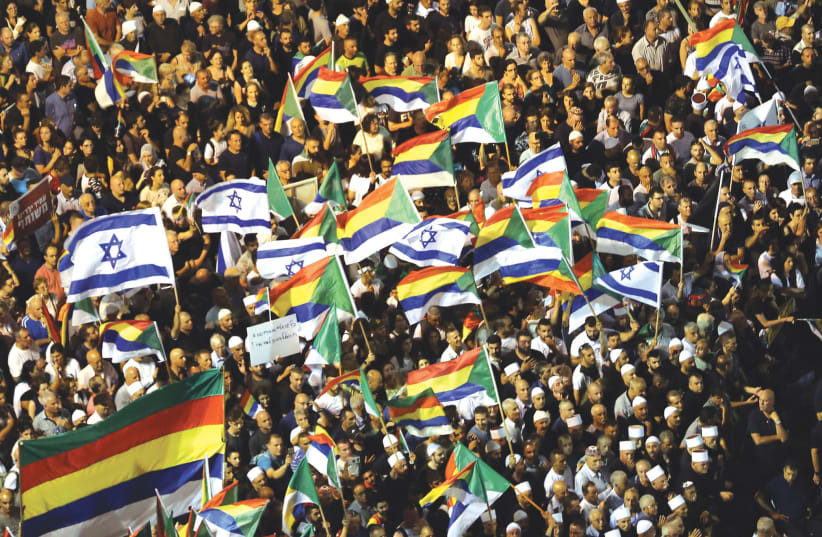Some of my peers said it might have been considered offensive when – in a Facebook post a few weeks ago mourning the death of Aiia Maasarwe – I referred to her as an Israeli-Arab rather than as a Palestinian. I saw this as an opportunity to not only clarify why I refer to the Arab community in Israel proper as Israeli-Arabs or Arab citizens of Israel, but also to discuss how I think the role of denial of identity is a core feature of the Israeli-Palestinian conflict.
There are approximately 1.7 million Arabs residing within the Green Line who possess Israeli citizenship, and they identify themselves in a variety of different ways. A 2015 poll conducted by Israeli sociologist Sammy Smooha found that slightly over 60% of Arabs in Israel identify themselves as some form of “Palestinian,” while the nearly 40% identify themselves as some form of “Arab,” without affiliation to Palestinian national identity. The Arab Druze community in Israel might be a good case example of the latter group.
The Druze serve in the Israel Defense Forces, and virtually all of them identify themselves more with Israel than with the Palestinians. This may be because in Druze culture, they tend to identify themselves with their respective host country, though they still feel excluded in Israel as Arabs. Thus, referring to the Arab community in Israel proper as Israeli-Arabs or Arab citizens of Israel may be more representative.
Nevertheless, there are still many Arabs in Israel, and many Arabs residing between the Jordan River and the Mediterranean Sea, who do identify themselves as Palestinian, and we should respect that.
One of the driving forces behind the conflict is the cycle of denial between Israelis and Palestinians. Many Israelis often quote Golda Meir’s notorious phrase, “There are no Palestinians.” They suggest that “Palestinians” are just Arabs who already have 22 other states, and therefore Israel should not have to commit to a two-state solution with them.
Similarly, many Palestinian nationalists say they recognize Jews as a religious community, but not as a nation of people. That is why you may hear some Palestinians say they want a one-state solution where everyone has equal rights – but a Palestinian Arab state where the Jews would have religious community status and Palestinian citizenship and live under Palestinian law, not have national status like their Arab counterparts.
Of course, the cycle of denial between Israelis and Palestinians may not be unique when compared to other conflicts over land.
For example, the Catalan referendum for independence in October 2017 sparked outrage among Spanish nationalists. This may be because some Spanish nationalists do not recognize Catalans, and see them as just another Spanish group who only speak a slightly different dialect. There has also been denial of Kurdish national identity by Turkish nationalists, who refer to them as “mountain Turks” who also only speak a slightly different dialect.
In order to understand why some people deny the identity of another people, we must first understand how identities are invented in the first place.
In his academic article “Collective Memory as Social Representations,” social psychologist Daniel Bar-Tal suggests that identities are social constructs which are shaped by collective memories. For Israelis, their identity is constructed by their collective memories of historic antisemitism, such as the Holocaust, and the fear of being surrounded by hostile Arab countries. For Palestinians, their national identity is constructed by the memories of the Nakba (“catastrophe”) and the years of living under Israeli military rule.
However, because their stories and sense of victimhood conflict with each other, the groups tend to ignore or deny the other side’s narrative. For instance, Israelis may refrain from acknowledging the Nakba and the victimhood of Palestinians throughout the conflict because they feel it would undermine their courage and bravery in fighting for their independence and survival. Reciprocally, the Palestinians may hesitate to acknowledge events like the Holocaust because they see it as justifying the Nakba. They may also lack empathy for Israelis who have suffered from terrorist attacks because the Palestinians may see acknowledging the victimhood of Israelis as ignoring their own suffering while living under occupation.
Given that their respective narratives are at the core of their identities, the neglect and denial of the other’s story may be what leads them to deny the legitimacy of their adversary’s sense of peoplehood. Indeed, by not acknowledging the Nakba, Israelis may not see how Palestinians are any different than the other 22 Arab states. And by not acknowledging historical events of antisemitism like the Holocaust, and Israelis’ narrative of struggling to survive, the Palestinians may see Jews as a divided religious community rather than a united people.
Therefore, the way to overcome this cycle of denial is to bring more Israelis and Palestinians together to hold dialogues and recognize each other’s narratives. They may not necessarily have to embrace every part of their rivals’ stories, but they will need to express basic showings of respect and acknowledgment before a peace agreement can be implemented. By acknowledging one another’s narrative and understanding how that creates their sense of peoplehood, more Israelis and Palestinians may begin to support each other’s right to self-determination.
The writer is a contributing writer for the Israel Policy Exchange.
